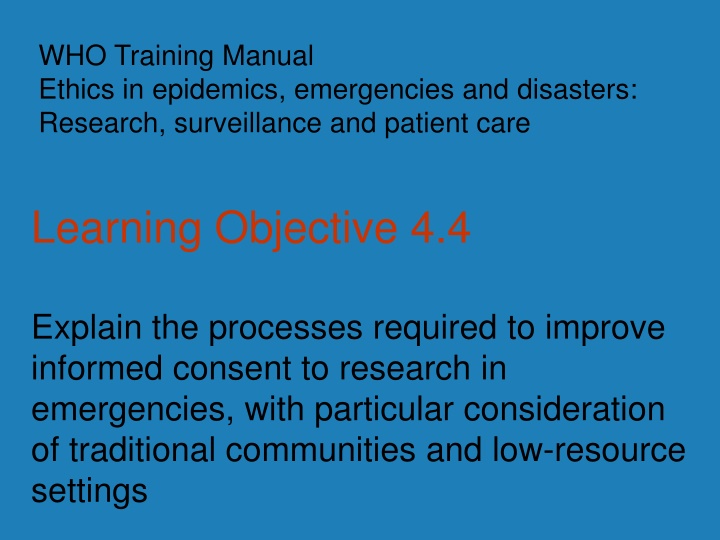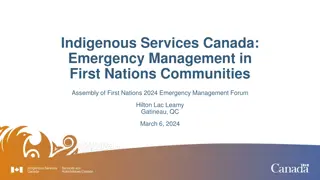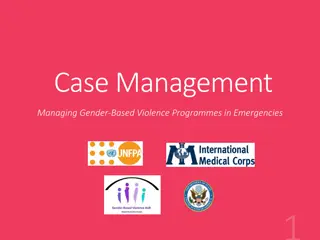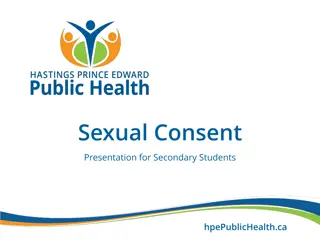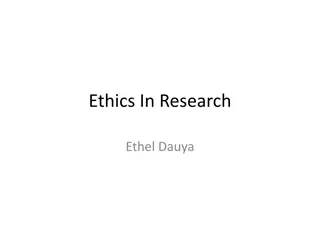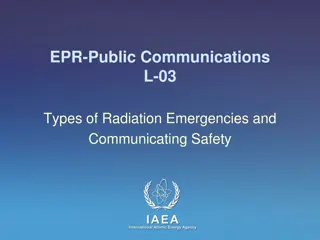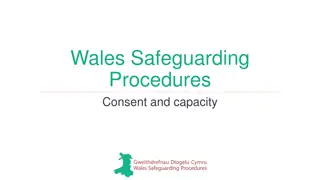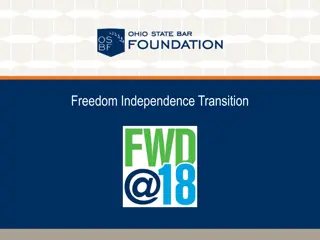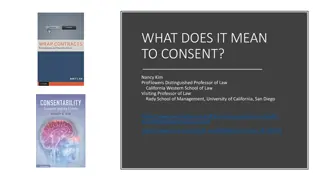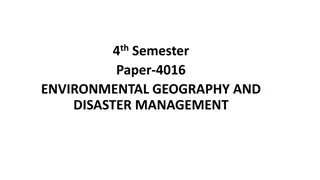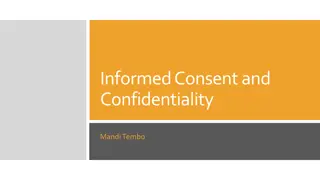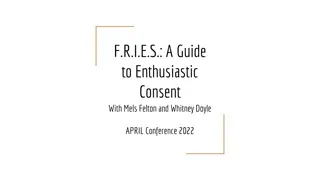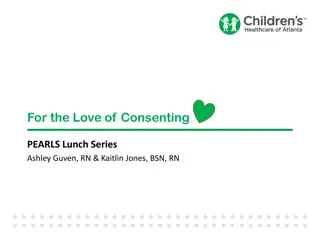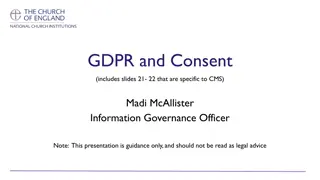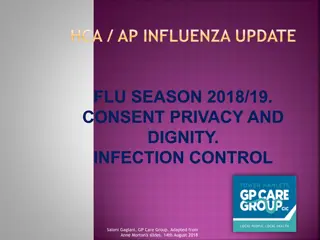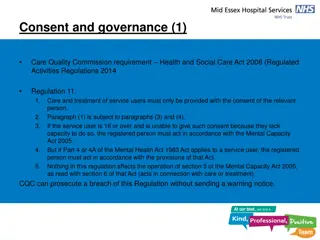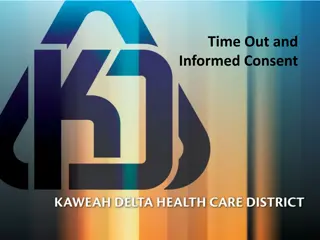Improving Informed Consent in Emergencies for Traditional Communities
In emergencies and low-resource settings, obtaining informed consent for research can be challenging due to language barriers, illiteracy, and poverty. This training manual explores processes to enhance informed consent, particularly focusing on traditional communities. Factors impacting consent, community consultation, and involving host communities in research are covered.
Download Presentation

Please find below an Image/Link to download the presentation.
The content on the website is provided AS IS for your information and personal use only. It may not be sold, licensed, or shared on other websites without obtaining consent from the author.If you encounter any issues during the download, it is possible that the publisher has removed the file from their server.
You are allowed to download the files provided on this website for personal or commercial use, subject to the condition that they are used lawfully. All files are the property of their respective owners.
The content on the website is provided AS IS for your information and personal use only. It may not be sold, licensed, or shared on other websites without obtaining consent from the author.
E N D
Presentation Transcript
WHO Training Manual Ethics in epidemics, emergencies and disasters: Research, surveillance and patient care Learning Objective 4.4 Explain the processes required to improve informed consent to research in emergencies, with particular consideration of traditional communities and low-resource settings
Outline 1. Introduction and background Presentation informed consent in traditional communities 2. and populations in low-resource settings 3. Case studies Pfizer Trovan trials 4. Group work - exploring possible issues at stake 5. Discussion 6. Summary Suggested time Activity 0-15 (15 min) Introduction 16-25 (10 min) Slide presentation 26-45 (20 min) Reading 46-65 (20 min) Group work 66-85 (20 min) Discussion 86-90 (5 min) Summary and conclusion L.O. 4.4
Background Informed consent necessary prior to enrollment in public health research Challenges in obtaining truly informed consent for research in low-resource setting or traditional community include: Language Research illiteracy Lack of empowerment Poverty L.O. 4.4
Background In a public health emergency there is another layer of complexity This makes communities increasingly vulnerable and at risk of harm There is a lack of guidelines for obtaining consent of vulnerable populations in emergencies (Bhutta 2004) L.O. 4.4
Factors impacting on consent External factors taken into consideration in decision to partake in research: Therapeutic misconceptions Monetary incentives Availability of medicines Quest for relations of trust, community Concerns with power differentials Concerns with exchange and fairness These are cultural responses to research, but also responses to poverty and political/economic instability Some of these factors might affect voluntariness and autonomy L.O. 4.4
Involving traditional communities in research Community consultation might be appropriate when primary risks of a study extended to communities as a whole, rather than to individual members Input of host communities must be sought early enough in the research design process to allowing influencing of the project design Preliminary meetings should be held to discuss the aims of the research, the methodology and the expectations in an appropriate manner Revisions should be considered if the community disagree with aspects of the proposal L.O. 4.4
Informed consent in traditional communities Informed consent process mandated by international research ethics guidelines may be foreign to local traditions Even in crisis, community consent cannot usually be considered a waver to obtaining individual consent to participation in research All community members (irrespective of socioeconomic background) should be able to participate in the informed consent process Researchers might need to take additional precautions to protect vulnerable groups from unnecessary harm L.O. 4.4
Advice for researchers Researchers are advised to: Investigate possible cultural sensitivities before deployment Be attentive to population needs Involve local staff and interpreters in community and individual consultation Strengthen community engagement as part of the research process and involve communities in the development of protocols, as well as in the conduct of research Ensure there is not coercion of individuals Carefully consider cultural dimensions of particular ethnic/social groups when designing approaches to informed consent Considering existing community structures in the decision-making process L.O. 4.4
Low-resources settings Many of the above issues also apply to populations in low- resources settings Populations refusing to participate in research may lack access to information to enable them to give informed consent Populations in low-resources settings are at particular risk of coercion and exploitation due to their limited abilities to generate income L.O. 4.4
Informed consent in low-resources settings During an emergency health systems may be overstretched and unable to meet participants health care needs. Researchers and aid agencies must ensure: Host populations basic needs are met throughout the research Host populations have access to basic health care services Research teams do not drain any health care resources for their study and thereby deprive the local population of accessing health care If above are carried out, one can be more comfortable that the host population has a real choice This is essential in true informed consent L.O. 4.4
Benefits to participants in low-resources settings Although research bears potential benefits, it cannot be carried out at the risk of exploiting the participants Researchers should not only focus on ensuring a direct form of reciprocity (between the participant and the researcher) Researchers bear an obligation to assess means to support the participants or to strengthen the local health system L.O. 4.4
Case study reading Case study 1: Meningitis in Nigeria (see also Murray (2007), Boseley & Smith (2010), M decins sans Fronti res (2011), Okonta (2014), and Nyika (undated)) L.O. 4.4
Group work a) In general, what is the ethical challenge of conducting research with traditional communities and/or in low-resource settings? b) How (if so) could Pfizer have avoided the wrongdoing and resulting scandal? L.O. 4.4
Summary Traditional communities and populations in low-resource settings are vulnerable in research This is due to cultural differences, skills and knowledge imbalance, poverty, political instability, and lack of access to health care Research must balance the benefits of future patients with protection of those involved in research Researchers should consider meeting with community representatives prior to commencing research Individual consent should be obtained Researchers should mitigate the risks of coercion and exploitation L.O. 4.4
Sources Murray S. (2007). Anger at deadly Nigerian drug trials. BBC news website, 20.06.2007. http://news.bbc.co.uk/2/hi/africa/6768799.stm accessed 12 September 2014) Bosely S, Smith D. (2010). As doctors fought to save lives, Pfizer flew in drug trial team. The Guardian, 9.12.2010. http://www.theguardian.com/business/2010/dec/09/doctors-fought-save-lives- pfizer-drug accessed 12 September 2014) MSF. (2011). Statement: Pfizer promoted misleading and false accusations of MSF's involvement in unethical drug trials the company conducted in Nigeria in 1996. http://www.msf.org/article/statement-pfizer-promoted-misleading-and- false-accusations-msfs-involvement-unethical-drug accessed 12 September 2014) http://www.msf.org.uk/pfizer_statement_20110105.news L.O. 4.4
Acknowledgements Chapter author Clarinval, Caroline, Institute of Biomedical Ethics and History of Medicine, University of Zurich, Switzerland L.O. 4.4
